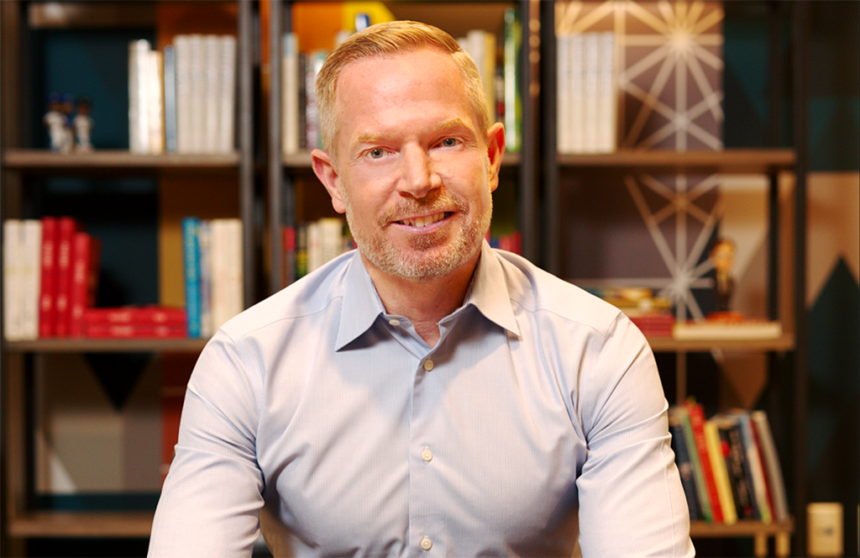Late last month, Omnicom Health Group named Matt McNally, then the global president of Dentsu Health, as its CEO. McNally, who previously held leadership roles at Outcome Health and Digitas Health, replaced longtime company chief Ed Wise, who retired.
Shortly after starting his new job, McNally spoke with MM+M about priorities, the work honored at Cannes and his broader industry outlook. This interview has been lightly edited for length and clarity.
MM+M: Share some impressions from your first few weeks on the job.
McNally: When you look at the breadth and depth of agencies, service offerings and capabilities that OHG has, I haven’t seen anything like it. Everything from the preclinical and scientific work that we do globally, all the way through to the med-comms and media business – it’s been exciting to understand that whole breadth and scale.
So I’ve been meeting all the agency leads – the CEOs from the various markets around the world – and we’re excited to act around tech, media, innovation and data. We want to turbocharge this thing for what’s next based on what our clients are asking for, based on the velocity of change that we’re seeing in health and wellness, along with the changes in the pharmaceutical pipeline to more advanced science. That excites me. It’s been a lot of fun.
A lot of people talk about bringing in strategies from other industries and incorporating them into healthcare marketing. What does that particular future look like to you?
It’s interesting because there are themes that everyone is speaking to, like data, technology and omnichannel. I think humanity needs to be re-infused back into healthcare. People can chase the shiny object and think about data, but we’ve been talking since I got here about “what does ‘data with soul’ mean? What are the insights that we’re getting out of data that will let us engage with physicians and patients in a new way?“
That engagement can take the form of new media channels – but most importantly, that engagement is going to take the look and feel of new content and creativity. It’s going to be a far less transactional feeling. The data will help us understand physicians and patients better.
We’re going to start leaning in and celebrating science again. I’ve been doing this a long time and at the birth of DTC advertising, it was allergy and heartburn medications. This was very high-science, but was a much more consumer-driven decision versus what we’re seeing now with the advances in oncology and rare diseases. There’s this balance of creativity as well as science being elevated and celebrated just as it was during COVID with the vaccines launching in record time.
You were a juror at Cannes. What work stuck out to you”
What I saw was this embracing of humanity. One great work was the P&G Whisper “The Missing Chapter” campaign. It detailed how there are 23 million girls in India that, when they reach puberty, they drop out of school, because reproductive health and getting your period as a woman is not talked about. That chapter is literally ripped out of textbooks across India. It’s such a taboo topic that girls are not even educated about it from their mothers or their sisters.
So the idea was, “What do we do about getting 23 million young girls back in school?” They developed an amazing campaign that was about educating girls about that missing chapter. It was picked up globally in the news and then there was a beautiful use of out-of-home where they made murals about reproductive health, getting your period and what that looked like in regions near schools in areas that were highly populated by teen women.
That humanity lens on the pharma side, similar to the “I Will Always Be Me” campaign marked a beautiful use of technology. Again, this was another great example of where people lead with humanity.
What industry trends do you have your eyes on?
I’m focused on behavior change and think we need to be more courageous as an industry. We’re saving lives and we talk about it every day. We are all laser-focused on the patient; every agency that works in healthcare and every pharmaceutical manufacturer somewhere in their mission calls out that they truly put patients at the center of what they do.
Candidly, I believe patients deserve better. The creative work needs to be better and the services that we provide them needs to be better. For me, it’s not about the shiny object or jumping on omnichannel and all the things that yes, are important. I think we need to be more courageous about the work. We need to be more courageous about how we’re supporting physicians and patients and try new things.
The work needs to look different, because a lot of the work looks interchangeable. It’s people walking on beaches. We often blame legal or regulatory and I don’t blame them at all; they’re doing a job and we are a regulated industry. We need to stop looking at the rules that hamper and hinder creativity and think about how we are going to work within those rules to drive better work and drive better support for patients.
Lastly, there needs to be better connectivity between patient and physician marketing. Agencies like ours are poised to do that because we have both patient and HCP agencies. It’s been siloed for a while at pharmaceutical companies, because very few have a true chief marketing officer that’s driving that integration. That’s a role for the agencies to stand up and seize because, especially with the pipeline today, consumer DTC and HCPs need to be much more integrated than they were in the past.







